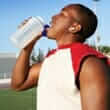Background
- Creatine is naturally synthesized in the human body from amino acids primarily in the kidney and liver and transported in the blood for use by muscles. Approximately 95% of the body's total creatine content is located in skeletal muscle.
- Creatine was discovered in the 1800s as an organic constituent of meat. In the 1970s, Soviet scientists reported that oral creatine supplements may improve athletic performance during brief, intense activities such as sprints. Creatine gained popularity in the 1990s as a "natural" way to enhance athletic performance and build lean body mass. It was reported that skeletal muscle total creatine content increases with oral creatine supplementation, although response is variable. Factors that may account for this variation are carbohydrate intake, physical activity, training status, and muscle fiber type. The finding that carbohydrates enhance muscle creatine uptake increased the market for creatine multi-ingredient sports drinks.
- Use of creatine is particularly popular among adolescent athletes, who are reported to take doses that are not consistent with scientific evidence, and to frequently exceed recommended loading and maintenance doses.
- Published reports suggest that approximately 25% of professional baseball players and up to 50% of professional football players consume creatine supplements. According to a survey of high school athletes, creatine use is common among football players, wrestlers, hockey players, gymnasts, and lacrosse players. In 1998, the creatine market in the United States was estimated at $200 million. In 2000, the National Collegiate Athletic Association (NCAA) banned colleges from distributing creatine to their players.
- Creatinine excreted in urine is derived from creatine stored in muscle.
References
- Branch JD. Effect of creatine supplementation on body composition and performance: a meta-analysis. Int J Sport Nutr Exerc Metab 2003;13(2):198-226.
View Abstract - Cramer JT, Stout JR, Culbertson JY, et al. Effects of creatine supplementation and three days of resistance training on muscle strength, power output, and neuromuscular function. J Strength Cond Res 2007 Aug;21(3):668-77.
View Abstract - Escolar DM, Buyse G, Henricson E, et al. CINRG Group. CINRG randomized controlled trial of creatine and glutamine in Duchenne muscular dystrophy.Ann Neurol 2005 Jul;58(1):151-5.
View Abstract - Faager G, Söderlund K, Sköld CM, et al. Creatine supplementation and physical training in patients with COPD: a double blind, placebo-controlled study. Int J Chron Obstruct Pulmon Dis 2006;1(4):445-53.
View Abstract - Groeneveld JG, Veldink JH, van der Tweel I, et al. A randomized sequential trial of creatine in amyotrophic lateral sclerosis. Ann Neurol 2003;53(4):437-445.
View Abstract - Javierre C, Barbany JR, Bonjorn VM, et al. Creatine supplementation and performance in 6 consecutive 60 meter sprints.J Physiol Biochem. 2004 Dec;60(4):265-71.
View Abstract - Kendall RW, Jacquemin G, Frost R, et al. Creatine supplementation for weak muscles in persons with chronic tetraplegia: a randomized double-blind placebo-controlled crossover trial. J Spinal Cord Med 2005;28(3):208-13.
View Abstract - McMorris T, Mielcarz G, Harris RC, et al. Creatine supplementation and cognitive performance in elderly individuals. Neuropsychol Dev Cogn B Aging Neuropsychol Cogn 2007 Sep;14(5):517-28.
View Abstract - NINDS NET-PD Investigators. A randomized, double-blind, futility clinical trial of creatine and minocycline in early Parkinson disease. Neurology. 2006 Mar 14;66(5):664-71.
View Abstract - Pluim BM, Ferrauti A, Broekhof F, et al. The effects of creatine supplementation on selected factors of tennis specific training. Br J Sports Med 2006 Jun;40(6):507-11; discussion 511-2.
View Abstract - Roitman S, Green T, Osher Y, et al. Creatine monohydrate in resistant depression: a preliminary study. Bipolar Disord 2007 Nov;9(7):754-8.
View Abstract - Roy BD, de Beer J, Harvey D, et al. Creatine monohydrate supplementation does not improve functional recovery after total knee arthroplasty. Arch Phys Med Rehabil 2005 Jul;86(7):1293-8.
View Abstract - Schneider-Gold C, Beck M, Wessig C, et al. Creatine monohydrate in DM2/PROMM: a double-blind placebo-controlled clinical study. Proximal myotonic myopathy. Neurology 2-11-2003;60(3):500-502.
View Abstract - Skare OC, Skadberg, Wisnes AR. Creatine supplementation improves sprint performance in male sprinters. Scand.J Med Sci.Sports 2001;11(2):96-102.
View Abstract - Vorgerd M, Zange J, Kley R, et al. Effect of high-dose creatine therapy on symptoms of exercise intolerance in McArdle disease: Double-blind, placebo-controlled crossover study. Arch Neurol 2002;59(1):97-101.
View Abstract







